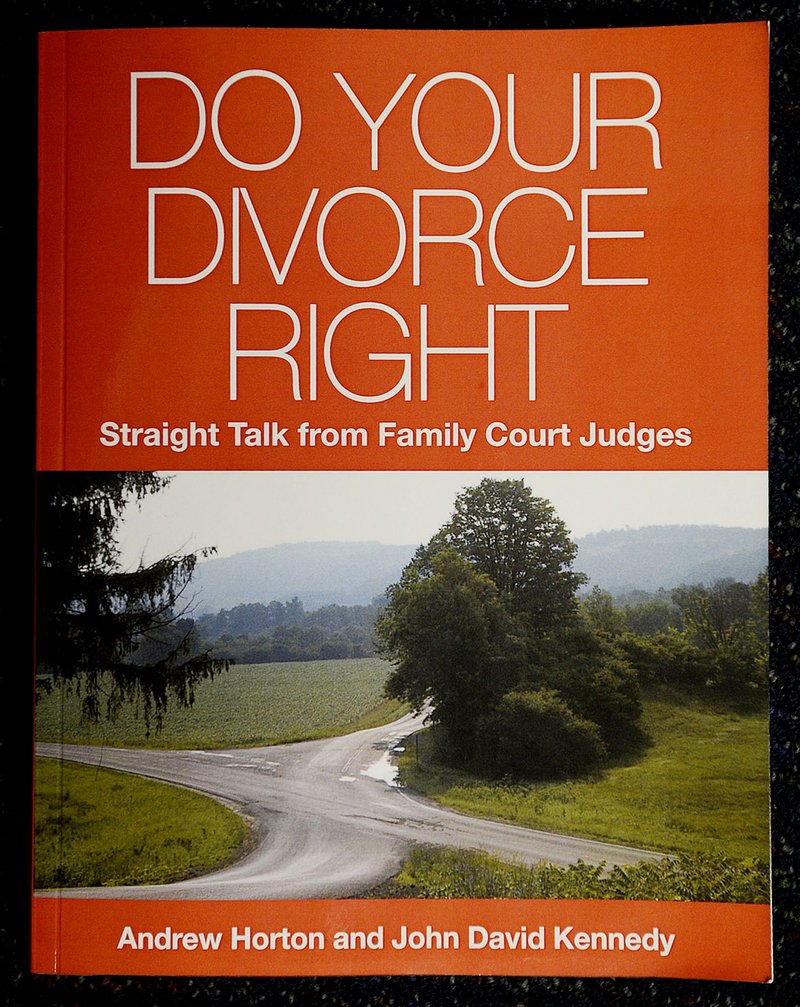PORTLAND – After presiding over thousands of divorce cases, Superior Court Justice Andrew Horton and District Court Judge John David Kennedy have likely seen and heard it all.
There was the man who argued he was the primary caregiver of the cat but turned out not to know its sex. The Tupperware dispute that ended with the lids going to one spouse and the bottoms to the other. The woman arrested after getting drunk, donning her wedding dress and punching her cheating husband. The man who sprayed his almost-ex with Mace outside the courthouse in an attempt to protect the honor of his new girlfriend.
But perhaps the most telling anecdote in the judges’ book, “Do Your Divorce Right,” is more sobering.
It’s about a young woman whose substance abuse problem had its roots in her parents’ drawn-out, caustic divorce. Various treatment options hadn’t helped the woman, and she was before Kennedy for the latest in a string of drug-related criminal probation violations.
“I really wished I had a video camera going so I could make a tape of that and show it to other people in family cases and say, ‘Is this really where you want your kid to end up?’” Kennedy said.
The judges, longtime friends, first started talking about the book about a decade ago, when Horton was a District Court judge and Kennedy was a family law magistrate. Both were witnessing cases where the couples didn’t understand the long-term effects of a bitter court battle.
One of their goals was to let readers know they would be better off if they could look to “the better angels” of their nature — a phrase from Abraham Lincoln’s first inaugural address that opens and ends the book.
“At least in the long term, good guys finish first in family court,” Horton said. “Short term, the cutthroat tactics have their victories.”
Kennedy and Horton estimate that when they conceived of the book, at least one party was self-represented in three-quarters of divorce cases. They believe the numbers of those not represented by an attorney has since grown, but the court system does not track those kinds of figures. Some 6,500 divorce cases are filed in Maine courts annually.
The judges started working in earnest several years ago. They developed the outline, assigned themselves chapters and met every two weeks at the Starbucks in Falmouth to review their progress.
They aimed to balance general information with nuts-and-bolts specifics, such as an appendix on the rules of evidence for readers who have to represent themselves. Sidebars with anecdotes, explanations of legal terms and other practical information pepper the book.
The authors’ perspective of divorcing with integrity is part of the reason Tower Publishing wanted to add the book to its legal and reference titles, said Michael Lyons, who heads the Standish-based company.
“They’ve seen it done right, and they’ve seen it done wrong. They have a knowledge base that few people in society get to taste,” he said.
The book has been available for months, but there are hopes for additional exposure with advertisements in high-circulation magazines that are planned to start early next year. Bulk buying by counselors and lawyers has become a trend, Lyons said.
Among the book’s fans is Marge Coffey, a psychotherapist and collaborative coach who practices in Bethesda, Md. She got acquainted with it through a legal book club for lawyers and mental health professionals who work in collaborative divorce.
Coffey said the book is understandable, not overly technical and makes the reader feel respected rather than patronized.
“I recommend it to people who give me the appearance that they are decent, that they want their children to survive (the divorce) as best they can,” she said. “And they want to go to the bar mitzvahs, weddings and graduations with their co-parents and want to know how can they do it.”
Staff Writer Ann S. Kim can be contacted at 791-6383 or at:
akim@pressherald.com
Twitter: AnnKimPPH
Send questions/comments to the editors.




Comments are no longer available on this story